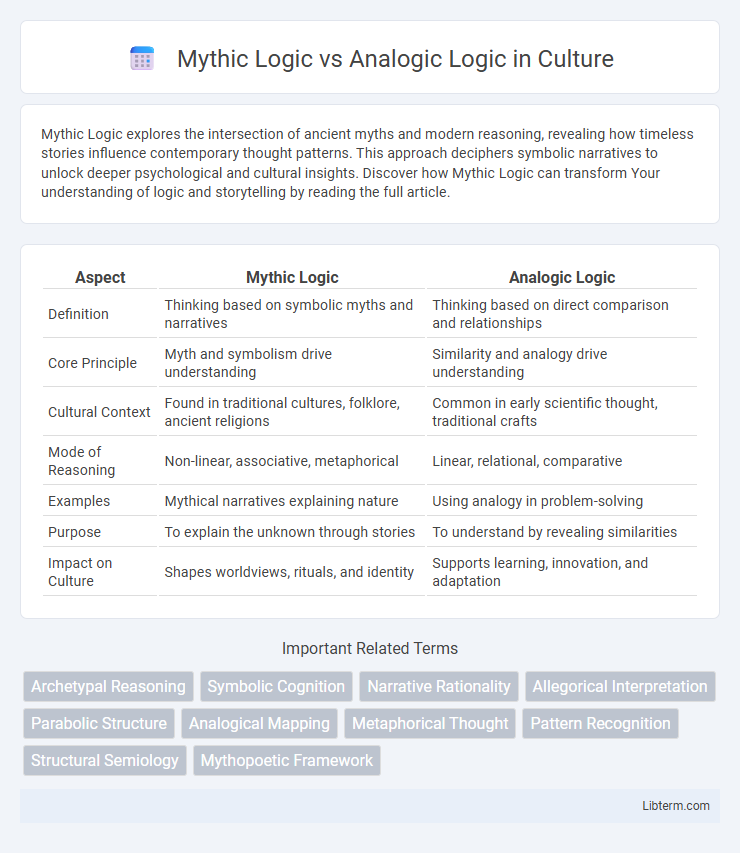Mythic Logic explores the intersection of ancient myths and modern reasoning, revealing how timeless stories influence contemporary thought patterns. This approach deciphers symbolic narratives to unlock deeper psychological and cultural insights. Discover how Mythic Logic can transform Your understanding of logic and storytelling by reading the full article.
Table of Comparison
| Aspect | Mythic Logic | Analogic Logic |
|---|---|---|
| Definition | Thinking based on symbolic myths and narratives | Thinking based on direct comparison and relationships |
| Core Principle | Myth and symbolism drive understanding | Similarity and analogy drive understanding |
| Cultural Context | Found in traditional cultures, folklore, ancient religions | Common in early scientific thought, traditional crafts |
| Mode of Reasoning | Non-linear, associative, metaphorical | Linear, relational, comparative |
| Examples | Mythical narratives explaining nature | Using analogy in problem-solving |
| Purpose | To explain the unknown through stories | To understand by revealing similarities |
| Impact on Culture | Shapes worldviews, rituals, and identity | Supports learning, innovation, and adaptation |
Introduction to Mythic Logic and Analogic Logic
Mythic Logic explores symbolic narratives and archetypes to interpret meaning beyond literal facts, emphasizing intuition and cultural myths in cognition. Analogic Logic relies on comparisons, metaphors, and analogies to draw parallels and infer conclusions, facilitating understanding through relational thinking and pattern recognition. Both frameworks provide distinct approaches to reasoning, with Mythic Logic rooted in storytelling traditions and Analogic Logic grounded in relational analysis.
Defining Mythic Logic: Origins and Principles
Mythic logic originates from ancient narrative traditions, using symbolic myths to explain natural phenomena and human experiences through metaphorical reasoning rather than empirical analysis. It prioritizes archetypal patterns and collective unconscious symbols, allowing for a holistic understanding of reality that integrates emotions, spirituality, and cultural values. This form of logic contrasts with analogic logic by emphasizing intuition and storytelling as core methods for knowledge transmission and meaning-making.
Understanding Analogic Logic: Foundations and Applications
Analogic logic operates on the principle of similarity and representation, using continuous values and analogies to draw conclusions rather than binary true-false evaluations found in mythic logic. It is foundational in fields such as artificial intelligence, cognitive science, and complex systems modeling, where reasoning about vague, imprecise, or incomplete information is essential. Applications of analogic logic include pattern recognition, natural language processing, and decision-making processes that require flexible, context-sensitive interpretations.
Key Differences Between Mythic and Analogic Logic
Mythic logic relies on narrative structures, symbols, and metaphors to convey meaning, emphasizing emotional and cultural resonance over empirical analysis. Analogic logic, by contrast, operates through direct comparison and resemblance, using similarities in form or function to establish understanding and draw conclusions. Key differences include mythic logic's focus on storytelling and symbolic interpretation versus analogic logic's reliance on observable, parallel relationships and systematic reasoning.
Historical Evolution of Logical Frameworks
Mythic logic, rooted in ancient storytelling and symbolism, predates formal analytical reasoning by embedding knowledge within cultural narratives and metaphors. Analogic logic emerged alongside early philosophical inquiries, emphasizing reasoning through analogies and comparative relationships to bridge known concepts with new insights. The transition from mythic to analogic logic marked a critical evolution in logical frameworks, paving the way for the development of formal deductive systems in classical antiquity.
Cultural Influences on Logic Types
Mythic logic thrives in cultures rich in storytelling and symbolism, where narratives shape understanding and truth is often perceived through collective memory and metaphor. Analogic logic predominates in cultures emphasizing empirical evidence and scientific reasoning, utilizing comparison and analogy to draw conclusions based on observable data. Cultural frameworks influence the preference for mythic or analogic logic by shaping cognitive patterns and epistemological values within societies.
Cognitive Implications of Mythic vs Analogic Thinking
Mythic logic centers on symbolic thinking, narrative structures, and intuitive understanding, which fosters emotional engagement and meaning-making in cognitive processes. Analogic logic emphasizes relational reasoning, pattern recognition, and systematic comparison, supporting analytical problem-solving and abstract thinking. The cognitive implications reveal that mythic thinking enhances creativity and cultural learning, while analogic thinking strengthens critical analysis and scientific reasoning.
Real-world Examples: Mythic Logic in Practice
Mythic logic is deeply embedded in cultural rituals where symbolic narratives guide social behavior, such as indigenous storytelling that reinforces communal values and environmental stewardship. It appears prominently in religious practices, where mythic logic shapes moral frameworks and influences decision-making through allegorical lessons found in sacred texts like the Bhagavad Gita or the Bible. These real-world examples demonstrate how mythic logic operates in a non-linear, symbolic manner distinct from the cause-and-effect reasoning of analogic logic, effectively shaping collective identities and ethical norms.
Practical Applications of Analogic Logic
Analogic logic excels in practical applications by modeling complex, real-world scenarios through continuous variables, making it ideal for control systems and signal processing. Unlike mythic logic, which relies on symbolic or narrative-based reasoning, analogic logic supports dynamic decision-making in engineering, robotics, and artificial intelligence by interpreting patterns and gradients. Its versatility in handling uncertainty and imprecision enhances optimization algorithms and adaptive systems in industries such as healthcare, finance, and manufacturing.
Integrating Mythic and Analogic Logic in Modern Discourse
Integrating mythic and analogic logic in modern discourse enriches communication by blending narrative symbolism with relational reasoning, enhancing both emotional resonance and conceptual clarity. Mythic logic leverages archetypal stories and metaphors to convey deeper meanings, while analogic logic facilitates understanding through pattern recognition and analogy-driven inference. Combining these approaches fosters a multidimensional dialogue that appeals to diverse cognitive styles and promotes holistic problem-solving across cultural and intellectual contexts.
Mythic Logic Infographic

 libterm.com
libterm.com